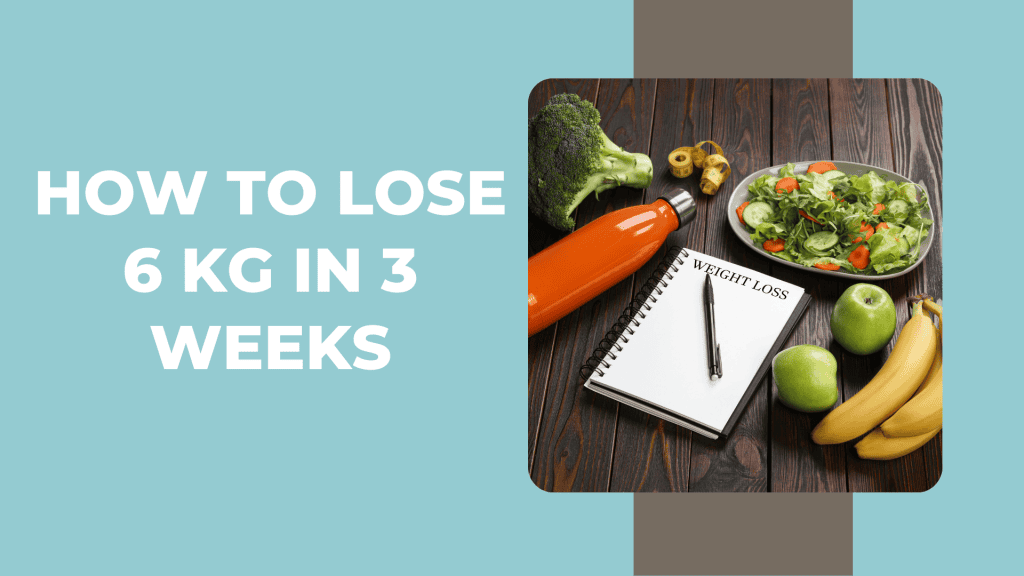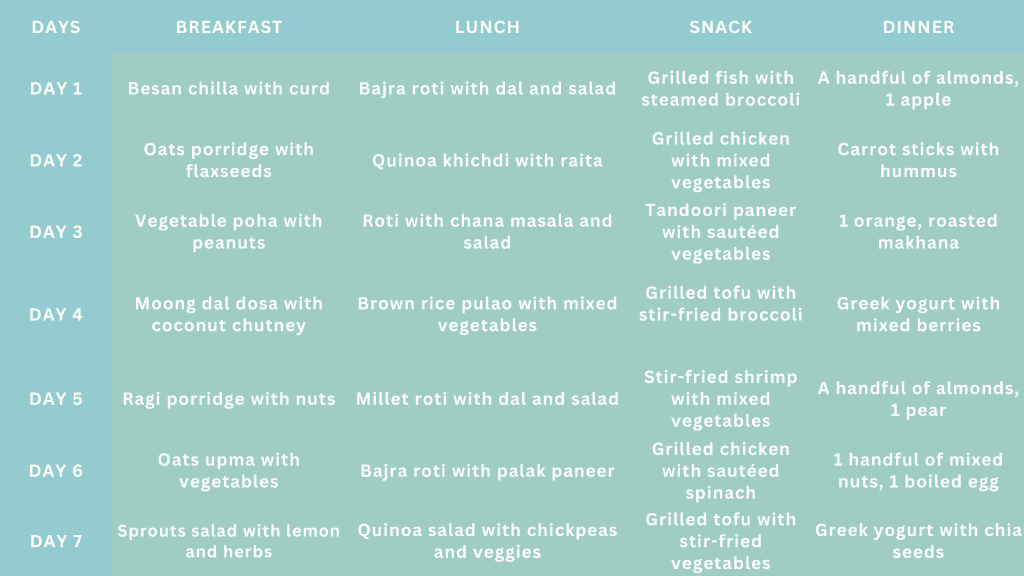To lose 6 kg in 3 weeks one needs to create a calorie deficit with 500 calories per day. One should include fibre rich foods which will enhance satiety and promote fullness as well lean proteins that boost metabolism and help in rebuilding muscle tissues. Incorporate a bundle of low GI fruits and veggies in your snacks and meals which will increase fullness and also fulfil your nutrient requirement. Consume whole foods and cautiously avoid processed foods that are rich in salt and sugar. It is also advisable to engage in strength training and cardio exercises which will help in shedding excess fat and also grow muscles. Continue reading to know more about how to lose 6 Kg in 3 weeks.
Can I lose 6 Kg in 3 weeks?
Yes, it is possible to lose 6 kg in 3 weeks by eating a calorie deficit diet rich in protein and fibre, practising regular exercise, making lifestyle changes, fulfilling hydration needs and avoiding excess consumption of salt and sugar. However, such advanced goals that require rapid weight loss might not be sustainable and safe for one’s health in the long run. One should aim to moderately lose around 0.5 to 1.3 kg of weight within a week. A balanced diet focusing on low calorie foods and whole foods, lean proteins, vegetables, and limiting processed foods and sugars is crucial. Additionally, incorporating regular aerobic exercise, such as brisk walking, running, or cycling, alongside strength training exercises, can help boost metabolism and preserve lean muscle mass. However, it’s important to note that individual weight loss outcomes can vary based on factors like starting weight, metabolism, and overall health. It is important to customise a structured plan with expert’s guidance to attain a weight loss that is sustainable and doesn’t pose any health complications rather than simply figuring out how to lose 6 kg in 3 weeks.
10 Ways on How to lose 6 Kg in 3 weeks?
To lose 6 kg in 3 weeks, one needs to cut down 500-750 calories from their diet and incorporate more sources of lean proteins, whole grains, and fruits and veggies. It is also important to exercise 5 to 6 days a week including both cardiovascular activities like running, hiking or skipping rope and also indulging in strength training to achieve a dual result of burning calories and also growing lean muscle mass. Below mentioned are 10 ways to achieve the same.
- Exercise 3 times a day
- Eat less calories than you need
- Eat smaller portions of meals
- Reduce salt intake
- Drink more water
- Increase Fiber Intake
- Increase the protein intake in each meal
- Eat a low carb diet
- Prepare your own meals
- Take good sleep
1. Exercise 3 times a day
Regular exercise is a boost to one’s mental and physical health both equally. Exercising three times a day can significantly boost weight loss efforts and help achieve the goal of losing 6 kg in 3 weeks by increasing calorie expenditure and maintaining a high metabolism throughout the day. It is important to practise both cardiovascular exercises and strength training to reduce weight and also grow lean muscle mass. However, it is important to start steady and not hasten up as overexertion can cause health complications like burnout or muscle injury. Regular exercise can also be accompanied with a Gym diet plan.
2. Eat less calories than you need
When talking about how to lose 6 kg in 3 weeks it is important to keep a calorie deficit by consuming less calories than you need and spending more through regular exercises. One should reduce around 500-750 calories a day and consume more veggies, fruits, whole foods and lean proteins. The calorie consumption can be reduced by avoiding processed, salty foods, carbonated and sugary drinks. One should also increase the water intake as it will help promote satiety and avoid overconsumption. Practising portion control and eating in small portions throughout the day can also help with reducing calorie intake. Utilise Daily calorie intake calculator to better assess your calorie intake.
3. Eat smaller portions of meals
Eating smaller portions of meals can help you reduce the overall intake of calories and also make you feel full at the same time. Some key tips to consume smaller portions is by serving in smaller plates, using measuring cups and chewing slowly. One should also drink water before meals as it will promote fullness and help you in avoiding overeating. Practising mindful eating to avoid consumption after being full and avoiding distractions like watching movies or scrolling through phone while eating can also assist in consuming smaller meals. It is also advisable to plan your meals ahead so as to prevent unhealthy food choices.
4. Reduce salt intake
Processed foods like pizza, fries and chips are excessively rich in salt which are often less satiating and can lead to excess consumption of calories and result in weight gain. Reducing salt intake also significantly helps in reducing water weight by causing water depletion. It is advisable to use low sodium products and refer to Nutrient Content on the packaging for the sodium content. Resort to spices, herbs and salt free seasonings instead of salt. It is always better to use fresh fruits and veggies as they are naturally low in salt.
5. Drink more water
Drinking more water can help you feel full and eat less as well as boost metabolic rate which can help burn more body fat. Water promotes natural breaking down of fat and better hydration also promotes better performance during exercise. Avoid sugary and carbonated drinks and replace them with water which will significantly reduce the calorie intake. You can carry a water bottle with or even utilise reminder apps that can help you fulfil your hydration needs. Water doesn’t just help with reducing weight but is also helpful in detoxifying the body by eliminating toxins.
6. Increase Fiber Intake
Fiber rich foods like oats, legumes, apples, bananas, nuts and seeds helps in slowing down digestion which keeps one full for long and prevents overeating. Foods rich in fiber also contain probiotics which promote gut-friendly bacteria that significantly improves gut health and also regulates bowel movements. You can increase your fiber intake by consuming more fruits and veggies, eating whole grains and adding beans to your food. You can also utilise oat bran or wheat germ by mixing them in your salad, fruit bowl or yogurt. While consuming fiber loaded foods it is advisable to ensure hydration through Weight loss drinks which will help in better digestion of fiber.
7. Increase the protein intake in each meal
Increasing protein intake in each meal can help reduce weight by boosting metabolism, reducing appetite, and preserving muscle mass. Protein takes longer to digest compared to carbs or fats, which helps you feel fuller for a longer period, reducing overall calorie intake. It also has a higher thermic effect, meaning your body burns more calories during digestion and processing. Moreover, protein has a higher thermal effect than fats and carbs which helps in boosting metabolism thus letting you burn calories even when the body is at rest.
8. Eat a low carb diet
Eating a low-carb diet can help reduce weight by lowering the amount of carbohydrates you consume, which forces your body to use stored fat for energy instead of carbs. When you reduce carbs, insulin levels drop, and your body burns fat more easily. This can lead to quicker weight loss, especially in the first few weeks, as your body loses water weight and begins to burn fat. Additionally, low-carb diets can help reduce hunger, making it easier to eat fewer calories overall. You can consider a keto diet plan that can lower carb intake and also attain weight loss.
9. Prepare your own meals
Preparing your own meals can help you take control of the ingredients you add and their portion. It can also help in reducing overall calorie intake and choosing healthier foods. With self preparation you can use a low fat cooking method by utilising less oil. This way you can easily eliminate processed foods from your diet and also be more mindful of your eating habits as well as portion sizes. One can also try their hands at the 30 30 30 rule for weight loss.
10. Take good sleep
A good night’s sleep helps in regulating hunger hormones thus suppressing hunger and controlling appetite. So, people who get proper sleep are less likely to crave high calorie foods and thus consume fewer calories. Poor sleep cycle has been linked to lowered metabolic rate which can make it difficult to burn calories. To ensure proper sleep, you should avoid excessive snacking right before bed time. It is also imperative to create a soothing environment that is quiet and dark, make sure you avoid phone time or watching Tv before bed. Indulge in regular physical activity which can help reduce stress and these two factors will together contribute towards getting an uninterrupted sleep.
Diet Plan to lose 6 Kg in 3 weeks
A healthy diet plan is key to achieving weight loss. It should include fiber and protein rich foods along with other essential vitamins & minerals and must be accompanied with liberal consumption of water. Below mentioned is the diet plan that you can accommodate in the span of 3 weeks to get desired results.
Week 1
Breakfast- Scrambled eggs with spinach, Greek yogurt with chia seeds & berries, Oatmeal with flaxseeds and almond milk
Lunch- Grilled chicken salad with olive oil, Quinoa with veggies and tofu, Lentil salad with cucumber and greens
Snack- 1 boiled egg, cucumber slices; A handful of almonds, 1 apple; Greek yogurt with chia seeds
Dinner- Grilled chicken with cauliflower rice, Chicken stir-fry with veggies
Week 2
Breakfast- Moong dal chilla with curd, Vegetable poha with peanuts, Oats upma with vegetables
Lunch- Brown rice with dal and mixed vegetables, Quinoa khichdi with raita, Brown rice pulao with vegetable curry
Snack- 1 apple, a handful of almonds; 1 pear, roasted makhana; Greek yogurt with berries
Dinner- Grilled paneer tikka with a side salad, Grilled fish with steamed broccoli, Moong dal soup with a small portion of rice
Week 3
Breakfast- Besan chilla with curd, Vegetable poha with peanuts, Ragi porridge with nuts
Lunch- Bajra roti with dal and salad, Roti with chana masala and salad, Millet roti with dal and salad
Snack- 1 orange, roasted makhana; A handful of almonds, 1 pear; Greek yogurt with chia seeds
Dinner- Grilled fish with steamed broccoli, Grilled tofu with stir-fried broccoli, Grilled chicken with sautéed spinach
Foods to avoid when losing 6 Kgs in 3 weeks
While aiming to lose 6 kg in 3 weeks, it is important to restrict certain food items which are rich in unhealthy fats, sugar or salt content as they can increase the calorie intake and also avoid several health complications. Below mentioned are some of the foods to avoid when losing 6 kgs in 3 weeks. For sustainable and healthy results under expert’s guidance, Buy Weightloss diet plan.
1. Sugary beverages
Sugary beverages like sodas, soft drinks and fruits juices contain empty calories with no nutrients and are also high in added sugars. This can lead to weight gain and also cause blood sugar spikes that can further enhance sugar cravings. Instead it is recommended to replace water with such drinks or consume whole fruits which are rich in vitamins, minerals, fibre and antioxidants.
2. Fried foods
Avoiding fried foods is important for weight loss because they are typically high in unhealthy fats and calories, which can quickly lead to overeating and weight gain. Fried foods often contain trans fats, which not only increase calorie intake but also slow down metabolism and promote fat storage. Instead you can consume baked or grilled foods which will be tastier and also have minimal fat content.
3. Refined breads and pastas
Refined breads and pastas are made up of refined flour which are high in calories and are also rich in simple carbs which can lead to weight gain. They are also low in essential nutrients like fiber, vitamins and minerals. A better alternative could be whole-grain varieties of bread and pastas which have low glycemic index and also contain certain nutrients.
4. White rice
White rice has a high glycemic index and thus they can increase the blood sugar levels in your body. This can cause several health complications such as risk of type 2 diabetes, heart diseases, stroke, certain cancer, obesity, etc. Brown rice, quinoa, and cauliflower rice are some of the healthier alternatives to white rice that people can opt for.
5. Processed meats
Avoiding processed meats is important for weight loss because they are often high in unhealthy fats, sodium, and preservatives, which can lead to weight gain and other health issues. Processed meats like sausages, bacon, and salami are calorie-dense but low in essential nutrients, making it easier to over consume calories without feeling full. Better alternatives to processed meats are lean protein sources like poultry, fish, and beans. Consider utilising a Food calorie calculator to analyse the calorie content of your food and better structure your diet plan.
How to calculate daily calorie intake to lose 6 Kg in 3 weeks?
To calculate your daily calorie intake for losing 6 kg in 3 weeks, you need to determine your Basal Metabolic Rate (BMR), estimate your daily activity level, and then create a calorie deficit by consuming fewer calories than your body needs. The goal is to establish a calorie deficit that safely promotes weight loss over time. This can be done through the help of a BMR calculator.
BMR and Daily Calorie Calculation:
BMR is the number of calories your body needs to perform basic functions like breathing, circulation, and cell production at rest. To calculate it, you can use formulas like the Mifflin-St Jeor equation based on your weight, height, age, and gender. Once you know your BMR, you multiply it by an activity factor to estimate the total calories you burn in a day, which includes physical activity.
For example, a 30-year-old woman weighing 70 kg, standing 165 cm tall, with moderate activity, might have a BMR of about 1,500 calories. If she exercises moderately, her total daily calorie needs could rise to around 2,200 calories. To lose 6 kg in 3 weeks, she needs to create a significant calorie deficit, about 1,000 calories per day, which means she should consume roughly 1,200-1,300 calories daily. This would result in approximately 7,000 calories burned per week (1 kg of fat is about 7,700 calories).
However, such rapid weight loss may not be sustainable in the long run and can also cause nutritional deficiency, loss of muscle, water and bone density, dizziness, menstrual irregularities and more.
Is it normal to lose 6kg in 3 weeks?
Losing 6 kg in 3 weeks is a highly ambitious and challenging goal but it is possible through calorie restriction and rigorous training. However, such rapid weight loss is not normal and is usually not recommended. Rapid weight loss is unsustainable and leaves a negative impact on the psychological and physical health of the individual. Gallstones, gout, constipation, diarrhoea, nausea, dizziness, irregular menstrual cycle, hair loss are some of the health complications that can turn up with sudden weight loss. It can also give way to psychological issues such as anxiety, eating disorders like binge eating, image issues and more. Thus, it’s important to aim for sustainable weight loss of 0.5 to 1 kg in a week through a healthy and balanced diet full of nutrient-rich foods and regular exercise. One should focus on making long term lifestyle changes and adopting healthier habits such as drinking more water, moving as much as possible, avoiding junk and getting proper sleep.
Expert Review on How to lose 6 Kg in 3 weeks
Dr. Amit Kochar is an expert nutritionist and he suggests that although it is possible to achieve 6 kg weight loss in 3 weeks, it might not be healthy in the long run. It is rather advisable to create a structured goal that is healthy and sustainable in the long run. One should aim to make subtle lifestyle changes by improving their dietary habits and daily routine, be more active, enhance hydration and engage in meditation to attain mindfulness and avoid stress.
References
“Consuming a Protein and Fiber-Based Supplement Preload Promotes Weight Loss and Alters Metabolic Markers in Overweight Adults in a 12-Week, Randomized, Double-Blind, Placebo-Controlled Trial.” n.d. NCBI. Accessed September 10, 2024. https://www.ncbi.nlm.nih.gov/pmc/articles/PMC9178960/.
Cox, Carla E. n.d. “Role of Physical Activity for Weight Loss and Weight Maintenance.” NCBI. Accessed September 10, 2024. https://www.ncbi.nlm.nih.gov/pmc/articles/PMC5556592/.
Kim, Young. n.d. “Optimal Diet Strategies for Weight Loss and Weight Loss Maintenance.” NCBI. Accessed September 10, 2024. https://www.ncbi.nlm.nih.gov/pmc/articles/PMC8017325/.
FAQs
1. How long does it take to lose 6 kgs?
It can take 6-7 weeks to lose 6 kgs. One can lose about 0.5 to 1 kg of weight in a week as per experts recommendation, any more weight loss than that can lower metabolic rate and may even cause nutritional deficiency.
2. Is 6 kg weight loss noticeable?
Yes, 6 kg weight loss is effectively noticeable, as the overall body fat reduces, changes can be seen in facial fat distribution giving way to defined jawline and cheekbones. However, the results of the same may vary from one person to another.
3. How to cut 6 kg in 3 weeks?
To cut 6 kg in 3 weeks, one needs to cut down their calorie intake by 500-750 kcals as well indulge in intense cardio and physical training. It is also important to avoid processed foods, salty and sugary items, carbonated drinks and stick to nutrient-rich diet that includes fresh fruits, veggies, lean proteins, nuts and seeds.










